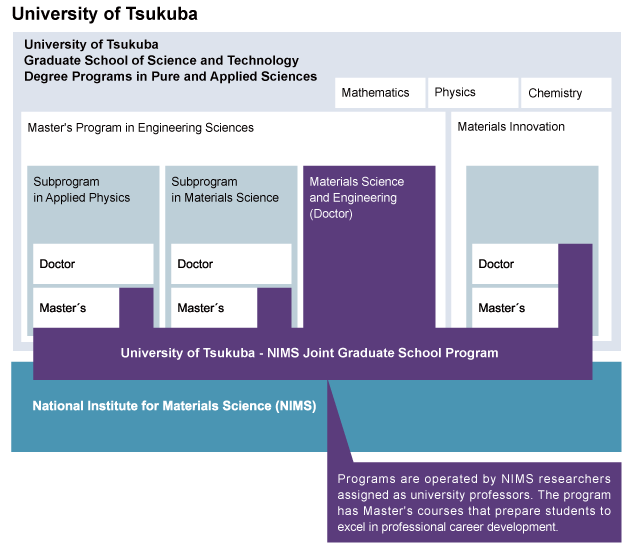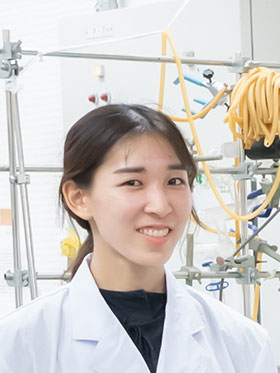View the course outline of the University of Tsukuba - NIMS Joint Graduate School Program.
- Home
- Program Outlines
Program Outlines
University of Tsukuba - NIMS
Joint Graduate School Program
The program is a new type of graduate school where the University of Tsukuba and NIMS work together to promote cutting-edge research in the field of materials science and engineering and to train scientists and technicians. The advantage of participating in research projects is that students will be able to learn the most up-to-date and relevant developments in materials science. Your research for your degree will be conducted in collaboration with researchers who are active at the forefront.
Cooperation with University of Tsukuba
NIMS and the University of Tsukuba have been collaborating a laboratory basis, as well as on the educational aspect of this program, utilizing the advantages of Tsukuba Science City for research cooperation in a variety of fields.
"Engineering Sciences : Subprogram in Materials Science and Engineering, Degree Program in Pure and Applied Sciences" is operated by the Cooperative Graduate School System at University of Tsukuba. This postgraduate education system allows students access to facilities and resources in leading edge research institutes to conduct their research by employing the researchers from these institutes as professors and associate professors of the University of Tsukuba.
University of Tsukuba website:

Place of activity
Most of the research activities will be held at the National Institute for Materials Science (NIMS, located in Tsukuba city, Ibaraki prefecture). All students will be enrolled in the NIMS research group to which the supervising professor belongs. The group and location are determined by where the supervising professor’s group is located: Sengen, Namiki or Sakura site. The lectures are held at the University of Tsukuba.
NIMS Sengen/Namiki and the university are about 15-20 minutes away by bus. NIMS Sakura is located within 10-minute bicycle distance from the university.
Subprogram in Materials Science and Engineering
"Subprogram in Materials Science and Engineering" is a discipline that helps to develop and use materials for various engineering applications. It is a key engineering field to support the infrastructure of modern society, such as energy, environment, information, communication, construction, transportation, medicine and welfare. This program is comprised of five fields: Organic- and Bio- Materials, Metals and Ceramics, Nanomaterials, Semiconducting Materials, and Condensed Matter Physics. It aims at educating students to become highly professional engineers or scientists in Materials Science and Engineering through hands-on research experience using advanced experimental facilities and by participating in major research projects.
Degree Program in Materials Innovation
The Degree Program in Materials Innovation is a program that educates experts in next-generation materials research. The program's aim is to develop global human resources by involving leading researchers from the Tsukuba region, conducting practical educational projects with top-level research facilities, conducting lectures and discussions entirely in English.
There are four research fields as follows:
Energy Materials Engineering
Research fields related to energy production, storage, and conversion, such as solar cells, fuel cells, batteries, and thermoelectric materials.
Environment-Friendly Materials Engineering
Research fields related to the environment, such as catalysts, organic and polymeric materials, biomaterials, and optical materials.
Electronic materials and engineering
Research fields related to electronic materials such as semiconductors, magnetic materials, spintronics, ultrafast spectroscopy, and state-of-the-art measurement.
Synchrotron-Radiation Materials Engineering
Research fields related to materials measurement using quantum beams such as synchrotron radiation and neutrons.
Combination of various programs at the University of Tsukuba and NIMS
One of the features of this program is that students receive support from both NIMS and the University of Tsukuba in various situations, in addition to research guidance. The program is designed to enable students to pursue their degrees while taking advantage of support systems for the research environment, student life, and financial aspects of the program.
Various Programs for current students
The program includes educational programs such as overseas study, living and research expenses, and human resource development projects that support various career paths.
 Website of Degree Program in Pure and Applied Sciences, Graduate School of Science and Technology, University of Tsukuba
Website of Degree Program in Pure and Applied Sciences, Graduate School of Science and Technology, University of Tsukuba
* Please see “Students” on the top page
Student Voice

Riho Tanimoto
Doctoral student in Subprogram in Materials Science and Engineering
I entered the doctoral program as a NIMS Junior Researcher. This scholarship program provides us monthly salaries to make us concentrate on our research activity without any concern, and also enables us to use advanced facilities in NIMS to develop our research.
Of course there are also other scholarships which support living expenses, however, NIMS Junior Researcher is unique in that we can easily use facilities in the most advanced material research institute, NIMS. And NIMS also has a lot of researchers who work in several fields based on advanced materials science. It provides many different perspectives in our fields.
Furthermore, we can get an opportunity to do research abroad, combining it with a university program. In my case, it was "Tsukuba Resonance Education Program." This program supports collaboration with researchers from different cultures and fields, allowing us to expand our research.
Thanks to this program, I was able to learn drug synthesis at my destination in addition to the materials research, which is a NIMS specialization, resulting in developing my research for materials that have the potential to help people's health. Similarly, the NIMS Graduate School is an attractive program, which expands our research and experiences, combining the NIMS system and university programs.
